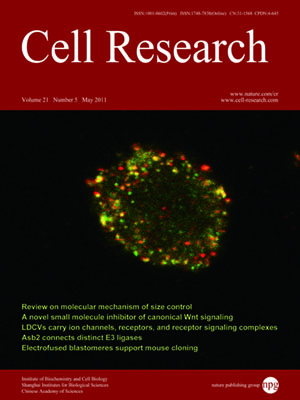
Volume 21, No 5, May 2011
ISSN: 1001-0602
EISSN: 1748-7838 2018
impact factor 17.848*
(Clarivate Analytics, 2019)
Volume 21 Issue 5, May 2011: 770-778
ORIGINAL ARTICLES
Mouse cloning and somatic cell reprogramming using electrofused blastomeres
Amjad Riaz1,2,*, Xiaoyang Zhao1,2,*, Xiangpeng Dai1,2,*, Wei Li1,2, Lei Liu1, Haifeng Wan1,2, Yang Yu1, Liu Wang1 and Qi Zhou1
1State Key Laboratory of Reproductive Biology, Institute of Zoology, Chinese Academy of Sciences, 1st Beichen West Road, Beijing 100101, China
2Graduate School, Chinese Academy of Sciences, Beijing 100049, China
Correspondence: Qi Zhou,(qzhou@ioz.ac.cn)
Mouse cloning from fertilized eggs can assist development of approaches for the production of 揼enetically tailored� human embryonic stem (ES) cell lines that are not constrained by the limitations of oocyte availability. However, to date only zygotes have been successfully used as recipients of nuclei from terminally differentiated somatic cell donors leading to ES cell lines. In fertility clinics, embryos of advanced embryonic stages are usually stored for future use, but their ability to support the derivation of ES cell lines via somatic nuclear transfer has not yet been proved. Here, we report that two-cell stage electrofused mouse embryos, arrested in mitosis, can support developmental reprogramming of nuclei from donor cells ranging from blastomeres to somatic cells. Live, full-term cloned pups from embryonic donors, as well as pluripotent ES cell lines from embryonic or somatic donors, were successfully generated from these reconstructed embryos. Advanced stage pre-implantation embryos were unable to develop normally to term after electrofusion and transfer of a somatic cell nucleus, indicating that discarded pre-implantation human embryos could be an important resource for research that minimizes the ethical concerns for human therapeutic cloning. Our approach provides an attractive and practical alternative to therapeutic cloning using donated oocytes for the generation of patient-specific human ES cell lines.
Cell Research (2011) 21:770-778. doi:10.1038/cr.2010.180; published online 28 December 2010
FULL TEXT | PDF
Browse 2226


